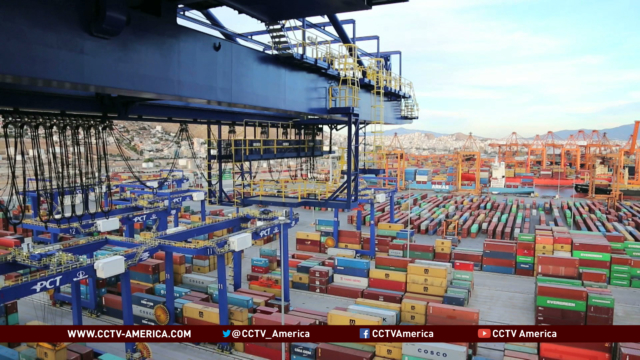Greece’s two major ports Piraeus and Thessaloniki, along with 10 regional ports, are up for sale through concession deals with property remaining in the hands of the government but management given away. Piraeus, strategically situated at the crossroads of Asia, Africa and Europe, is the first in line. Port privatizations are part of a delayed and wider sell-off scheme of Greece’s public assets set by the country’s international creditors. Filio Kontrafouri reports from Athens.
It’s full steam ahead for the privatization of Piraeus, Greece’s biggest port, a move that hopes to bring in cash for the government but also jobs for the people. In an interview with CCTV, Greek Minister of Shipping, Miltiadis Varvitsiotis, says for Piraeus alone, the government aims to attract investments totaling $815 million dollars in the next five years.
Many consider Chinese transportation giant, COSCO to lead the race. It began using the container terminal in 2009, which until then was a state-owned business. Since then, business has been booming and China has openly said it wants to further participate in the development of the port. COSCO’s successful investment in the port of Piraeus highlights the potential for Greece’s top port. Experts say that further investments, in just a few years can turn Piraeus into the biggest commercial port in the Mediterranean.
The sell-off of Piraeus will be completed by the end of the year. Greece is a country wary of privatizing public assets and many fiercely fought COSCO’s arrival at the port in 2009. Selling the rest of it could turn into a challenge once again. While the smaller ports are officially up for sale, the Greek Shipping Minister says there are no definite plans for their privatization and their fate will depend on the investors’ interest and the capabilities these ports can offer.

Port privatization shows its influence in Greece
Greece's two major ports Piraeus and Thessaloniki, along with 10 regional ports, are up for sale through concession deals with property remaining in the hands of the government but management given away. Piraeus, strategically situated at the crossroads of Asia, Africa and Europe, is the first in line. Port privatizations are part of a delayed and wider sell-off scheme of Greece's public assets set by the country's international creditors. Filio Kontrafouri reports from Athens.For more on the global shipping industry we are joined by Jean-Paul Rodrigue, Professor at the Dept. of Global Studies & Geography at Hofstra University.

 CGTN America
CGTN America
